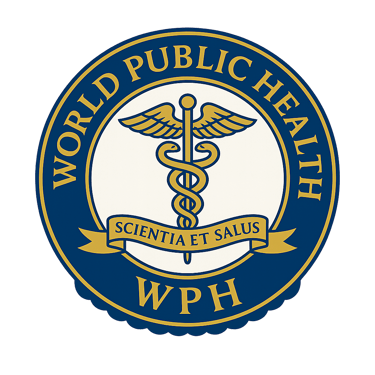Health Equity and Social Determinants: Building a Fairer World
By David Adeyemo World Public Health
1/16/20253 min read


Introduction
Health is more than the absence of disease. It reflects the environments in which people are born, grow, live, work, and age. The World Health Organization describes these as the social determinants of health. Inequities in education, income, housing, and opportunity influence who enjoys long life and who faces preventable illness or early death. Millions continue to suffer poor health outcomes not because of medical causes alone but because of the conditions surrounding their daily lives.
Achieving health equity requires changing systems, not just treating diseases. It calls for fairness in policy, justice in distribution, and inclusion in governance. This vision defines the core of public health in the modern era.
The Landscape of Health Inequality
Across every region of the world, inequality remains a persistent barrier to good health. Children born in low-income countries are far more likely to die before reaching the age of five than those born in higher-income nations. Women in developing regions face greater risks during pregnancy due to limited access to care and trained health professionals. Even within wealthy nations, racial and economic divides strongly influence who receives adequate care.
Communities with fewer educational opportunities face higher rates of chronic illness and mental health challenges. Unstable housing, poor sanitation, and unsafe working conditions create cycles of poor health that pass from one generation to the next. These conditions are not random. They result from the choices societies make about how resources and opportunities are shared.
Education, Income, and Opportunity
Education gives people the knowledge and confidence to make informed health decisions. It also leads to stable employment, which provides income and access to care. In contrast, limited education traps communities in poverty and limits access to nutritious food, safe housing, and preventive health services.
When economic progress benefits only a small portion of society, inequality widens. In such settings, the wealthy live longer and healthier lives while the poor face constant vulnerability. To close this gap, governments must invest in education, fair wages, and social programs that protect every citizen.
Gender and Health Equity
Gender shapes health in complex ways. In many parts of the world, women still struggle to access education, reproductive services, and leadership roles. Gender-based violence and social restrictions add to health burdens. At the same time, men often face higher exposure to occupational hazards and are less likely to seek medical care.
True equity requires policies that respect and protect all genders. Empowering women through education and financial independence consistently improves community health outcomes. When societies treat gender equality as a public health goal, everyone benefits.
Global Systems and Governance
Health equity depends on leadership and accountability. The WHO’s Commission on Social Determinants of Health reminds us that inequities are created by policy, not fate. Governments must consider health in every decision they make, including those on housing, labor, and transportation.
The United Nations Sustainable Development Goals (SDGs) provide a path forward, particularly Goal 3, which seeks to ensure healthy lives and well-being for all ages. Organizations such as World Public Health bridge the global vision of the SDGs with local action, ensuring that progress reaches people at the community level.
Community Empowerment and Local Solutions
Lasting progress begins in communities. Programs that listen to local voices and respect cultural contexts achieve stronger results. Community health workers, mobile clinics, and public health education campaigns bring care closer to those who need it most.
Building local capacity is essential. This includes training new public health professionals, collecting accurate data, and supporting local research. When communities design and lead their own solutions, they create health systems that are resilient and sustainable.
The Path Forward
A fair world is built on justice, compassion, and inclusion.
Recognition: Acknowledge that inequities are structural and must be addressed at their roots.
Reform: Strengthen policies that close gaps in education, income, and access to care.
Representation: Ensure that marginalized groups have a voice in decision-making.
When health systems are built on fairness, societies grow stronger, and every individual gains the opportunity to thrive.
Conclusion
Health equity is a moral and practical foundation of global progress. The success of a nation is not measured only by its economy but by how it protects its most vulnerable citizens. Addressing the social determinants of health is the path toward a world where everyone can live with dignity, safety, and well-being. As World Public Health continues to promote fairness and inclusion, it stands among global partners working toward a future where no one is left behind.
About the Author:
David Adeyemo, RN, MSN, MPA, MS-HRM, CPH, PhD(c), is the Founder and President of World Public Health. He is a public health nurse, Army medical officer, and global health scholar dedicated to advancing public health leadership and equity worldwide.


